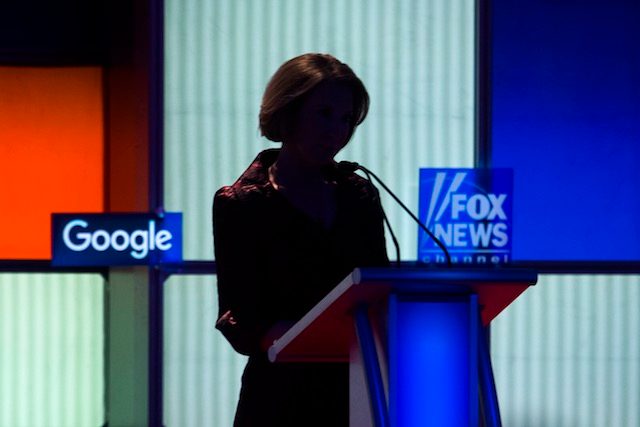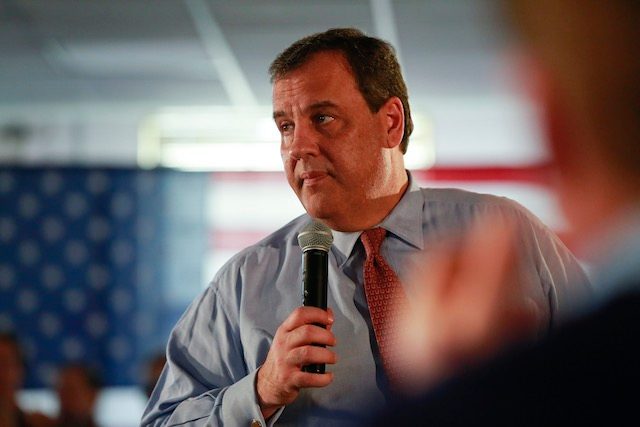SUMMARY
This is AI generated summarization, which may have errors. For context, always refer to the full article.

WASHINGTON DC, USA – Two more Republicans ended their White House runs Wednesday, February 10, whittling down the field as the remaining GOP candidates and Democrat Hillary Clinton look to blunt the momentum of Donald Trump and Bernie Sanders down south.
New Jersey Governor Chris Christie and former Hewlett-Packard chief executive Carly Fiorina both called time on their presidential bids, one day after finishing sixth and seventh, respectively, in the New Hampshire primary.
Trump and Sanders – two political outsiders with vastly different ideologies, but who have a common campaign credo of speaking what they say is truth to power – served notice in the Granite State on Tuesday, February 9, with their resounding victories.
Sanders almost doubled Clinton’s tally and Trump bested second place Ohio Governor John Kasich by almost 20 percentage points.
Both results shocked the party establishments, virtually guaranteeing bitter and drawn-out races for the Democratic and Republican nominations.
New Hampshire was the second stop in the months-long process to choose the two candidates who will vie to succeed President Barack Obama on Election Day, November 8.
“I leave the race without an ounce of regret,” Christie said in a Facebook post, noting that while his message had been heard by many, it was “just not enough and that’s ok.”
Fiorina, the only woman in the Republican field, said she would “continue to travel this country and fight for those Americans who refuse to settle for the way things are and a status quo that no longer works for them.”
‘Work to do’ for Clinton
So where do the other candidates go from here? South Carolina and Nevada, where both parties will stage nominating contests before month’s end.
The upcoming votes will be crucial for Clinton, the former secretary of state who admitted in an uneasy concession speech that she had “some work to do, particularly with young people,” to revitalize her campaign.
Clinton is seen as enjoying strong support among black voters and Sanders, realizing the need to boost his standing with African Americans, met Wednesday with prominent civil rights activist Al Sharpton in New York.
“My concern is that in January of next year, for the first time in American history, a black family will be moving out of the White House,” Sharpton said.
“I do not want black concerns to be moved out with them.”

Clinton said she recognized the American electorate’s fury with establishment politics.
“People have every right to be angry,” she said. “But they’re also hungry, they’re hungry for solutions.”
‘Kitchen sink’
Sanders has signaled he is in the race to win and expects the coming weeks to be even more closely fought. The next battle is in Nevada on February 20, followed by South Carolina.
“They’re throwing everything at me except the kitchen sink, and I have the feeling that kitchen sink is coming pretty soon,” he said in a buoyant victory speech.
Beefing up his ability to take the fight to Clinton for the long term, the Sanders camp announced he raised $5.2 million in the 18 hours following his New Hampshire win.
For now, he reigns supreme with young voters: Clinton received just 16% of the vote among people under 29, according to New Hampshire exit polls.
‘Glaring differences’
If the Democratic race is poised to take a more confrontational turn, then Republicans are set for all out internecine warfare.
Trump’s visceral assault on American politics brought him his debut victory after a second-place showing in last week’s Iowa caucuses.
It was a must win for Trump, after his embarrassing performance in the Hawkeye State called into question his frontrunner status and brand as a winner.
But similar levels of support for Kasich, Senator Ted Cruz, Senator Marco Rubio and former Florida governor Jeb Bush left the field in turmoil. The last remaining candidate, retired neurosurgeon Ben Carson, finished farther off the pace.
Now the fight moves to South Carolina, a state with a lingering reputation for bare-knuckle campaign tactics.
Even before the candidates arrived, the state’s airwaves were being flooded with negative attack ads, with each man hoping to emerge as the mainstream answer to Trump.
“They’ve written me off in this campaign, over and over again,” Bush told supporters in Bluffton, South Carolina, arguing that his campaign got a new lease on life even though he finished fourth up north.
Cruz, challenging Trump for prominence in the anti-establishment far-right lane, highlighted their “glaring differences” during an appearance in South Carolina.
“The only candidate who can beat Donald Trump is me,” he said.
Rubio, who hoped to match or better his third-place Iowa finish, stumbled to fifth after he took a drubbing in the last debate before the vote, where he robotically repeated his talking points.
He could only offer supporters a mea culpa.
“Our disappointment is not on you. It’s on me,” he said. “We did not do well on Saturday and so listen to this: That will never happen again.” – Michael Mathes, AFP / Rappler.com
Add a comment
How does this make you feel?
There are no comments yet. Add your comment to start the conversation.